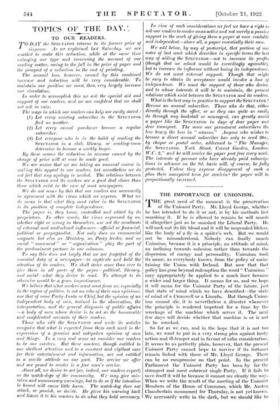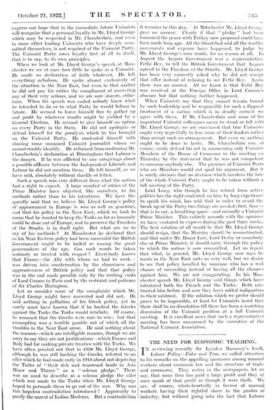THE IMPORTANCE OF UNIONISM.
11HE great need of the moment is the preservation of the Unionist Party. Mr. Lloyd George, whether he has intended to do it or not, is by his methods fast smashing it. If he is allowed to remain he will smash it altogether just as he smashed the Liberal Party. He will suck out its life blood and it will be suspended lifeless, like the body of a fly in a spider's web. But we would not be misunderstood. Nobody can finally smash Unionism, because it is a principle, an attitude of mind, an inclining towards cohesion rather than towards the dispersion of energy and personality. Unionism took its name, as everybody knows, from the policy of main- taining the Union with Ireland. But now that that policy has gone beyond redemption the word " Unionism " may appropriately be applied to a much finer because a wider and larger thing. It means for us, and we hope it will mean for the Unionist Party of the future, just that state of mind which we have described—the state of mind of a Cromwell or a Lincoln. But though Union- ism cannot die, it is nevertheless a disaster whenever the principle is rendered impotent for a time by the wreckage of the machine which serves it. The next few days will decide whether that machine is or is not to be wrecked.
So far as we can, and in the hope that it is not too late, we want to put in a very strong plea against hasty action and ill-temper and in favour of calm consideration. It seems to us perfectly plain, however, that the present Unionist Party cannot hope to survive if its fortunes remain linked with those of Mr.• Lloyd George. There can be no compromise on that point. -In the present Parliament the Unionist Party has been by far the strongest and most coherent single Party. If it fails to save itself it will be because it cannot see clearly the way. When we write the result of the meeting of the Unionist Members of the House of Commons, which Mr. Austell Chamberlain summoned for Thursday, is not yet known. We necessarily write in the dark,- but we should like to express our hope that in the immediate future Unionists will recognize that a personal loyalty to Mr. Lloyd George which may be respected in Mr. Chamberlain, and even in some other leading Unionists who have deeply com- mitted themselveS, is not required of the Unionist Party. The Unionist Party owes loyalty first of all to itself, that is to say, to its own principles.
When we look at Mr. Lloyd George's speech at Man- chester we see at once how little he spoke as a Unionist. He made no declaration of faith whatever. He left everything nebulous. He spoke almost exclusively of the situation in the Near East, but even in that matter he did not pay his critics the compliment of answering any of their very serious, and we are sure sincere, critic- isms. When his speech was ended nobody knew what he intended to do or to what Party he would belong in future. He - seemed to leave himself free to gather up and profit by whatever results might be yielded by a General Election. He seemed to give himself an option on every Party in the State. He did not apologize or defend himself for the paralysis which he has brought on the Unionist Party. He contented himself with abusing some unnamed Unionist journalist whom we cannot readily identify. He refrained from confirming Mr. Chamberlain's declaration at Birmingham that Labour is the danger. If he was afflicted by any misgivings about a possible alliance between the Independent Liberals and Labour he did not mention them. He left himself, as we have said, absolutely without shackle or fetter.
Such a speech was very different from what the nation had a right to expect. A large number of critics of the Prime Minister have objected, like ourselves, to his methods rather than to his intentions. We have fre- quently said that we believe Mr. Lloyd George's policy of appeasement in Europe is wise as well as generous, and that his policy in the Near East, which we took to • mean that he wanted to keep the Turks as far as humanly could be done out of Europe, and to preserve the Freedom of the Straits, is in itself right. But what are we to say of his methods ? At Manchester he declared that as his Near Eastern policy had been successful the British Government ought to be hailed as among the great peacemakers of the age. Can such words be taken seriously or treated with respect ? Everybody knows that France—the Ally with whom we had to work— was driven into consternation by the clumsiness and aggressiveness of British policy and that that policy was in the end made possible only by the rushing visits of Lord Curzon to Paris and by the restraint and patience of Sir Charles Harington.
Let us consider some of the complaints which Mr. Lloyd George might have answered and did not. He said nothing in palliation of his Greek policy, yet he surely must have known that if he backed the Greeks against the Turks the Turks would retaliate. Of course, he assumed that the Greeks were sure to win but that assumption was a terrible gamble out of which all the troubles in the Near East arose. He said nothing about the reasons—which are intelligible reasons, though we are sorry to say they are not justifications—which France and Italy had for making private treaties with the Turks. We have often pointed out that in 1920 Mr. Lloyd George, although he was still backing the Greeks, referred to an offer which he had made early in 1918 about not depriving the Turks of " their rich and renowned lands in Asia Minor and Thrace " as a " solemn pledge." There was no need to describe as a solemn pledge the offer which was made to the Turks when Mr. Lloyd George hoped to persuade them to go out of the war. Why was this hopeless contradiction introduced ? Apparently to pacify the unrest of Indian Moslems. But a contradiction it remains to this day. At Manchester Mr. Lloyd George gave no answer. Clearly if that " pledge " had been honoured the peace with Ttirkey now proposed could have been made long ago. All the bloodshed and all the warlike movements and expense have happened, to judge by Mr. Lloyd George's own words, for no reason at all. In August the Angora Government sent a representative. Fethi Bey, to tell the British Government that Angora agreed to the Freedom of the Straits. Mr. Lloyd George has been very earnestly asked why he did not accept that offer instead of refusing to see Fethi Bey. Again there was no answer. All we know is that Fethi Bev was received at the Foreign Office in Lord Curzon's absence but that nothing further happened.
When Unionists say that they cannot remain bound by such leadership and be responsible for such a flippant treatment of a nation which is in deadly earnest we agree with them. If Mr. Chamberlain and some of his important Unionist colleagues mean to stand or fall with Mr. Lloyd George, we arc convinced that true Unionists ought very regretfully to lose some of their leaders rather than accept such an arrangement. But even so, nothing ought to be done in haste. Mr. Chamberlain can, of course, easily defend his act in summoning only Unionist Members of the House of Commons to the meeting on Thursday by the statement that he was not competent to summon anybody else. The presence of Unionist Peers who arc Ministers would not spoil his argument. But it is surely obvious that no decision which involves the fats of the whole Unionist Party ought to be taken without a full meeting of the Party.
Lord Long, who though he has retired from active politics has the right conferred on him by long experience to speak his mind, has said that in order to avoid the break up of the Party two things are needed : first, time— that is to say, a breathing space—and secondly a Unionist Prime Minister. This entirely accords with the opinions we have ventured to express during the past three weeks. The best solution of all would be that Mr. Lloyd George should resign, that the Ministry should be reconstructed, and that under Mr. Bonar Law, Lord Derby or somebody else as Prime Minister, it should carry through the policy to which the nation is now committed. Let us repeat that what, in general, Mr. Lloyd George now says he wants in the Near East suits us very well, but we desire to sec that policy handled by someone who has a real chance of succeeding instead of having all the chances against him. We are not exaggerating. In his Man- chester speech Mr. Lloyd George said things which have infuriated both the French and the Turks. Both mis- trusted him before and now they have added indignation to their mistrust. If the solution which we prefer should prove to be impossible, at least let Unionists insist that there shall be no dissolution till there has been a searching discussion of the Unionist position at a full Unionist meeting. It is excellent news that such a representative meeting has been summoned by the executive of the National Unionist Association.



































































 Previous page
Previous page